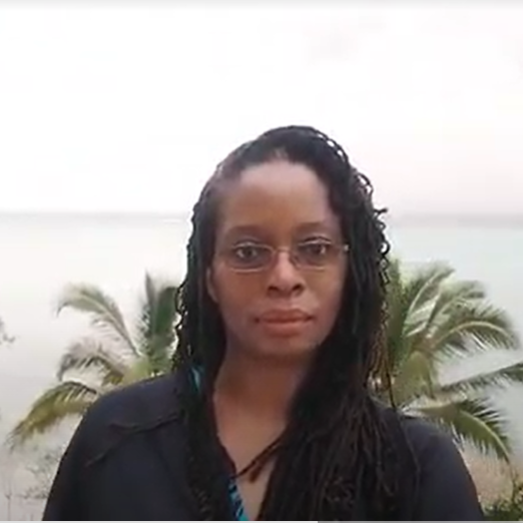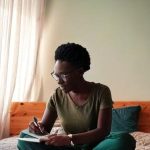The night breeze in Jos chirped and croaked with nature’s musical symphony, but Faith could hear neither the crickets nor the bullfrogs over the whispered beckoning of her dreams. She slept to escape, to be transported to a world filled with promises of success and opportunity.
“Faith!”
She rolled over in bed, trying to hold on to the image of herself in a beautiful dark blue skirt suit, standing in an office boardroom overlooking the Thames. She’d made a particularly reverting quip to an audience of men and women from all over the world and the room was about to erupt into a standing ovation.
“Faith!” This time, the sound wasn’t distant. It was right in the room with her.
Faith pried open her eyelids to see her mother’s frowning face. “Yes, Mommy. I’m awake,” she whispered, groggily.
“You’ve finished school. You’re an adult, now,” her mother stated, clapping her umber brown hands together to punctuate each word. “Is this how you’re going to behave in your husband’s house? Waiting for someone to wake you before you start your day…”
And on and on she went.
Faith had long learned to tune her out. She sat up in bed and waited for her mother to finish her soliloquy. “Good morning,” she said.
“Mtcheew,” her mother hissed, drawing out the universal sound of disapproval. “Go and buy some akaraand custard for breakfast,” she said before leaving Faith’s bedroom. “And sweep the compound when you’re done!”
Faith sighed, looking around at her small, sparsely furnished room. Her single bed was against one wall, her closet, desk and chair against the other with a tiny patch of floor space between the two. There were visible cracks in the paint on the cement wall. She sighed again. Imagine, a whole graduate with a first-class degree in engineering living like this, she thought. She was destined for bigger and better things somewhere else, like her friend Amina who had traveled to the United Kingdom a year ago.
She grabbed her wrapper and tied it over her nightgown then walked down the short hall to the kitchen. The electric kettle was useless with no power, as was often the case on their side of town. Instead, she used the gas stove to boil water for her bath. Her mood remained surly as she stepped out of the house. She didn’t feel the warmth of the sun or hear the happy twittering of birds. She did see the school children with their checkered red uniforms coming out of the other homes in the shared compound.
“Good morning, Aunty Faith,” they chorused.
“Good morning,” she responded. How long will their innocence last? she wondered, carefully navigating the puddles that had collected along the footpaths between the homes. They’ll spend years in school, only to graduate into a country with no jobs in sight.
Amina no longer had to live like this, Faith thought, flagging down a minibus by the roadside and squeezing into the last available seat. When Amina, her friend, woke up in London, it would be in a nice flat with constant power. When she stepped outside, she walked on smooth roads without puddles, and when she took the bus, it would be one of those fancy red double-deckers, not a rickety white minibus. The last thing Faith heard was that Amina had found work at a hospital and had even started sending money home.
It took Faith ten minutes to get to the market and be greeted by another chorus of good mornings from the shopkeepers.
“Faith.” Mama Ebele, the portly middle-aged mother of Ebele Zabu, approached her as she haggled over the price of custard.
“It was 4,000 naira last week and you’re telling me that it’s now 6,000…”
While Faith continued bargaining with the shopkeeper, Mama Ebele shared her plans about starting a solar panel business.
“Faith,” Mama Ebele said, “as you have an engineering degree, you can help me oversee the process. I buy the panels wholesale and charge people small small to install them on their roofs…”
Faith said she would think about it, but she already knew she would decline. She was destined for greater things in the boardrooms of London. That was her dream. Her future was not in physical labour on the rooftops of Jos.
She was heading back to the market’s minibus depot with her custard and akara in tow when she ran into Kingsley.
He was all smiles and dimpled cheeks. “Faith. Let me carry those for you,” he said loudly.
“I got the news,” he whispered once he was within arm’s reach. “I’ve heard back from Amina’s contact.”
Faith stopped in the middle of the market’s narrow pathway.
“Let me pass!” a wheelbarrow boy shouted.
She remembered where she was—a bustling open market filled with hawkers, traders and shoppers—and continued walking.
So Kingsley would be on his way soon. Would she be the only one left in their trio?
“Her contact said he could get me to Libya for 200,000 naira. And from there, it’s only another 500,000 to cross into Italy. He said you don’t have to pay anymore once you’re in Europe. There are charities there that take care of you.”
“But it’s so dangerous,” Faith said. “Every day on the news, you hear of people drowning.”
“I can swim,” Kingsley said, puffing up his chest. “If Amina could do it. So can I.”
He had a point.
“There’s room for one more,” Kingsley said, his voice dropping even lower. “You should come with me.”
“Me?” Faith stopped once again in the middle of the walkway.
“Madam! Comot for road!”
“Sorry!” Faith said, stepping aside for a man on a bicycle loaded with textiles.
“How long will it take you to save up for a plane ticket, let alone a passport and visa?” Kingsley asked. “And some of these countries want to see millions of naira in your bank account,” he continued. “This is the cheapest way. Think about it.”
As they reached the depot, their conversation was drowned out by the calls of the minibus conductors.
“Bukuru!”
“Rantya!”
“Airport Road!”
Each one called out their destination in the controlled chaos of the bus depot.
Kingsley helped Faith into a waiting bus and handed her her wares. “We leave in a week.”
On her way home, squeezed between two passengers on the minibus as the busy streets of Jos rushed by, Faith wavered between ecstasy and worry; between the thrilling anticipation of being in London in less than three months—her dream within reach—and a gnawing feeling in the pit of her stomach.
She knew how dangerous it could be; she wasn’t naive. Still, Amina had gone with a group from her clan, and they had all survived. God had protected them. God would protect her and Kingsley too; there was no way they could fail.
Tonight, she would dream a dream like no other, Faith thought, smiling broadly. She quickly looked away when the conductor made eye contact with her, his expression puzzled. Her visuals would be richer, the sensations more vivid, and the emotions more intense.
Just as she had predicted, she dreamt that night, but it was nothing like she had imagined. People were screaming, sounds of agony coming from all around her.
“Wake up!”
Faith felt a muffled kick at her side.
“Wake up, or you’ll drown!”
She jolted awake to find Amina nose-to-nose with her.
“Amina?”
“Start swimming,” Amina said. “The boat is sinking.”
“Where am…How did I get—”
“Start swimming!”
Faith looked widely around her. Some people were trying to cling to the rapidly deflating raft; some were already in the water splashing helplessly, trying to stay afloat. A few were swimming to a distant shore. And through it all, the relentless swirl of screams mingled with prayers in a cacophony of languages.
“Coast guard!” someone shouted.
“Oh, thank God,” Faith breathed.
“Fool. They’re not here to save you,” Amina said. “They’re here to make sure you don’t get to their shores. If you try to get any closer, they’ll push you back.
Faith crab crawled away from the rising water, trying to get to the highest point of the raft. The water followed, relentless, its frigid fingers seeping into her clothes, and sliding against her skin, her progress hampered by a throng of flailing limbs. Her heart was beating out of her throat. “So what do we do?” she asked Amina, who had remained squatting beside her, watching the chaos around them.
“You get into the water and find anything that floats, even if it’s a person in a life jacket. They’ll tell you to be still and quiet. It’ll take all night, but the current will eventually wash you onto the shore.
Within a few minutes, Faith was shivering, but she held on to an Eritrean.
“What of the Coast guard?” she whispered to Amina, who was in the water beside them.
“They’ll be too busy with the others swimming for the shore. You stay still. Pretend you’re dead.”
“I feel so tired.”
“That’s because you haven’t eaten anything but stale bread in the last twenty-four hours. You’ve been on that raft, drifting, as it took on more and more water. Before that, you spent most of last month in the back of a pick-up truck.”
Time ticked slowly by, and her fingers grew numb. It was far worse than the dry cold of Harmattan. What was she doing here, Faith asked herself, when she could be warm and cozy under the covers in her tiny room.
“Wake up!”
Her eyes snapped open. She was still in the cold, wet, dark.
“Where’s Kingsley?” Faith whispered through chattering teeth.
“He’s not here. It’s just me and you,” Amina said. “You’ll be here all night, but you’ll eventually make it to the shore.”
Faith opened her eyes to a dull sunrise. She was on her back on the sands of the shoreline, every ounce of strength drained from her.
“They’ll find you here,” a voice said, “and herd you into one of their refugee camps.”
She’d turned at the sound of the voice to find Amina lying beside her. The sienna brown beauty that was her friend was gone. In its place was a haunted, haggard face with chapped, bleeding lips, her hair a tangled mess.
“Is this what happened to you?” Faith asked. “Is this how you survived? Where are the women you travelled with?”
Amina turned away from her, staring up at the sky. “We got separated, but we later found each other in one of the camps.”
Her friend was silent for a while before turning back to her. “Do you know how badly they treated us? Like we were criminals! They looked down on us from their lofty, moral high ground as they shuffled us from camp to camp across Europe. As if the governments we’re running from are not their own creation.” She laughed, a harsh hollow sound. “You should be happy to be here, they’ll say, even while you sleep on the hard ground with only a blanket to shield you from the cold.”
“But you made it,” Faith said. “You found a way. You’re in London now. You have a flat, and a job at a hospital.”
“Do I?” Amina asked, standing. “Don’t ever attempt this, Faith. If you must come, try to find a job first. They want workers. They will always have a need for manual labour.”
Faith dropped the bedpan she was holding in shock, the pungent yellow liquid spilling across her white pants and shoes. She blinked under the harsh fluorescent light, staring agape at the person lying in the hospital bed before her.
“Is that—”
“My job,” Amina said from the window. “Clean it up.” She pointed to a mop and bucket.
Faith shook her head. Wrinkling her nose in disgust, she tried to shake off the offensive liquid.
“These are the sorts of jobs they reserve for people like me and you,” Amina said. “It’s what you have to do to survive.”
“Your degree…”
Amina laughed again, that same harsh, bitter laugh. “I doubt I’ll ever be able to practice engineering here. Maybe if I go to one of their schools after I’ve saved up enough and I’ve learned to act like them, speak like them, look like them.
The mop and bucket were gone and Faith found herself in a bedroom with four bunk beds.
“My flat,” Amina said. “Shared with three other girls. Bunks beds,” she continued, sighing. “It’s like boarding school all over again. Except I have no roots here. I’m completely invisible.”
Faith looked around the room, shocked to find peeling paint, and mold along the corners of the ceiling.
“It was me in that hospital room,” Amina said, turning to her friend. “I caught some cold weather disease, or maybe it was stress and exhaustion. A coma. It brought me into your dream, somehow. Don’t worry, though. I’ll wake up soon and get back to this.” Amina spread her arms wide.
“Faith!” Her mother’s voice pierced through the dream.
“Switch with me,” Amina said.
“What?”
“Switch with me. You’ll wake up in a hospital right here in London, the city of your dreams, and I’ll wake up in your body back in Jos.”
Faith stepped back.
“This is what you wanted, isn’t it?” Amina asked, taking a step closer to her. “You won’t even have to take that horrible journey. Just will it to be, and you’ll wake up here.”
Amina clasped her shoulders, her nails digging into Faith’s skin. “I can’t just go back home. Not now. Not yet. I’ll have nothing to show. But if I can wake up in your body…”
The wild desperation in Amina’s eyes rooted Faith to the spot.
“There’s nothing for you in Jos,” Amina said. “You’ll just waste away in that house. Here, at least you can work towards your dreams. I’ll take up Mama Ebele’s offer. Use my degree to make that business a success. Expand to Abuja, then Lagos. Then who knows? Maybe Accra and Dakar.
“Faith!”
Amina shook her. “Switch with me!”
About the Contributor

Catherine Ezinne Oyiliagu (Izzy Agu) has over a decade of multifaceted writing experience. She’s a top-rated freelance writer on Upwork, specializing in technical writing, video scripts and short stories. Her short story, “Returnees”, made Italine’s digital magazine’s longlist for the Collins Elesiro Literary Prize in December 2020. Her upcoming novel, ‘A Dream Bewitched’, a medieval African retelling of Sleeping Beauty, was a finalist in ECW’s contest for Best New Speculative Novel. You can find more of her writing in the SOURCE Newsletter, where short stories explore the drama of work through real and fictional storytelling. She obtained her B.Sc. and M.Sc. from the University of Toronto.



